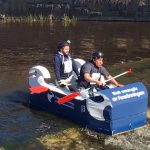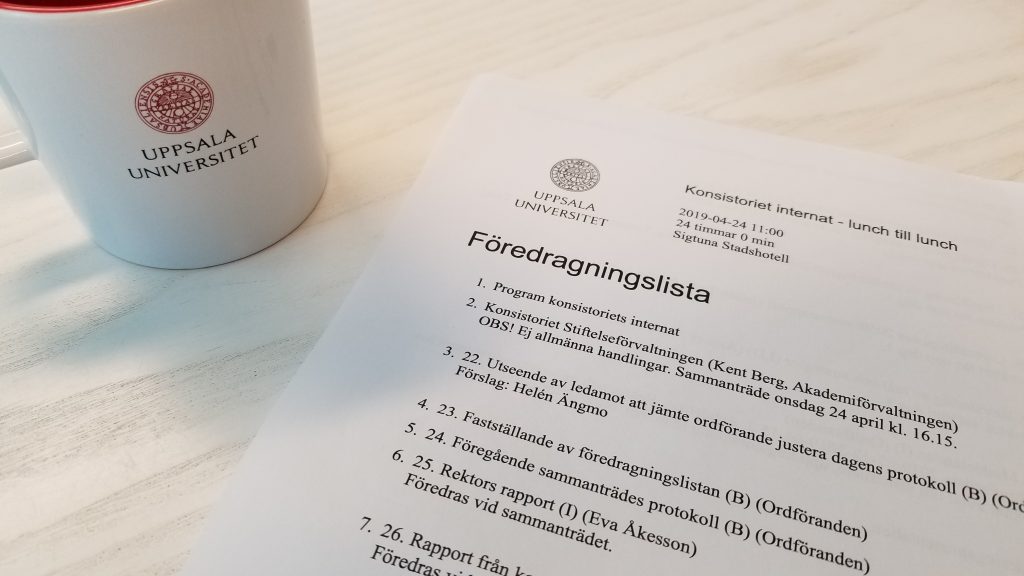Today we submitted our consultation response to the report of the Internationalisation Inquiry “Ökad attraktionskraft för kunskapsnationen Sverige” (“Making Sweden more attractive as a knowledge nation”, Swedish Government Official Reports 2018:78), an important and eagerly awaited report that takes up many strategic issues for the future of the sector. It has been a good process: inquiry chair Agnetha Bladh has kept up a close, ongoing dialogue with higher education institutions (HEIs) in Sweden and the report contains many highly relevant and well-reasoned proposals and recommendations. However, that does not mean we agree with everything or that there is nothing we miss.
Let us first recall some important general comments that we made on the first interim report, which the final report still does not adequately address.
Swedish HEIs need greater freedom of action and authority to make their own decisions in international matters. We have, and have always had, many close contacts around the world and the obstacles that crop up in our regular activities are obvious to us. Here the inquiry has not come up with satisfactory proposals on the way ahead. It offers no changes in some areas that we ought to be able to take for granted, like joining international networks without asking the government. This was a problem that came up a few years ago when we joined The Guild, a university network that is strategically important for us.
The inquiry report still does not discuss the importance of research infrastructure for internationalisation in any depth. It contains many proposals on education, but there are significant challenges in the area of research and these call for more attention. Research infrastructure is expensive, technically advanced and very much requires good opportunities for international collaboration.
Many measures still need to be taken to meet the goal that 25 per cent of all students will have spent at least three months abroad by 2025. Among other things, the national study administration systems must better reflect travel in connection with placements and degree projects.
It is good that the inquiry highlights the need to increase awareness of Sweden as a knowledge nation. It’s high time.
In the current revision of our mission, goals and strategies document, we note that the University operates in a global context characterised on the one hand by various types of partnerships and exchanges, and on the other hand by competition for talent and resources. Internationalisation is a strategy that supports the University’s development and helps enhance the quality and relevance of our education and research. And we have come a long way. We are building up new partnerships, for example, one of the largest research cooperation ventures between Sweden and South Africa, SASUF, and we have submitted an expression of interest in developing a European university network (EUN), together with our colleagues in U4. Moreover, we see a great increase in the number of fee-paying students who want to study here. We are working in these areas at all levels of the University.
We HEIs drive our own process of internationalisation and, this being so, it would be a mistake to continue to build on the current system of offices of innovation and science at Swedish embassies abroad, as the inquiry proposes. In organisational terms, these offices belong to the Government Offices, far from where internationalisation takes place in real life. To be sure, the inquiry proposes a pilot project in which two new offices would be set up closely linked with the ‘internationalisation platform’ that it proposes should be constructed in Sweden – and that these would subsequently be evaluated, together with the issue of which entity should be in charge. But that is not enough. To begin with, the pilot project should include HEIs’ own initiatives, such as our office in Hanoi, Vietnam, and Karolinska Institutet’s office in Hong Kong. These offices have substantial experience.
In addition, the link to the platform in Sweden would not result in HEIs having any significant influence. It is good that the inquiry underlines how desirable it is to bring about national coordination and collaboration on strategic internationalisation. We agree entirely. However, we have objections to the composition of the steering group for the platform, with government agencies mainly directing activities, while HEIs would have two representatives. If this proposal goes through, the higher education institutions will more or less be reduced to acting as implementers of orders from the steering group. Moreover, given the role of the Swedish Higher Education Authority as a supervisory authority, it is quite inappropriate that it should also have a role in the steering group for the platform.
We are happy about several parts of the inquiry report, for example, the proposal to further develop the Swedish system of scholarships for third country students. This is necessary. In the long run, having more international students can improve the quality and breadth of the courses and programmes we offer, not least at Master’s level. The proposal would give us increased control over scholarships from the Swedish Council for Higher Education, which is a good thing, and we are positive to the ‘flagship scholarships’ linked to strong research environments. However, it is a challenge to identify these environments and to ensure that the scholarships are long term. It takes time to embed new offers.
We are sceptical about the proposal that we should be allowed to use 0.3 per cent of our direct government funding for education for reducing tuition fees. Every krona of our direct government funding is needed to guarantee the quality of our core activities, which are already stretched financially. It would be preferable to be able to make certain reallocations within the framework of our income from fees.
In many respects, this inquiry has put its finger on the most important points, and we now look forward to it being translated into actual reforms.
(See also what we wrote when the inquiry presented its report in October 2018.)




